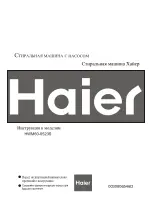
Page GB-18 Washing tips
Washing tips
Preparation
Remove tissues and foreign objects such as
needles, nails, coins, matches, paper clips,
clips or similar from your pockets . Turn the
pockets inside out if necessary and brush
them out .
Sorting through laundry
The washing instructions of the textile manu-
facturer/the international care symbols on the
labels contain precise information about how
to handle each piece of laundry .
We recommend sorting through the laundry
according to the following criteria:
– Type of fabric
– Boil wash/coloured wash (cotton)
– Easy-care synthetics
– Delicates, wool and hand wash
– Colour
– Wash white laundry separately, other-
wise it will turn grey .
– Wash new dark pieces separately at
first, as they lose their colour a lot the
first few times they are washed .
– Level of dirtiness
– If possible, remove stains when still
fresh, otherwise they will become par-
ticularly stubborn .
– It is best to pre-treat stains with water
and ox-gall soap .
Special materials
– Handle curtains especially carefully; it is
easy to get loose threads . Only put them
on a spin cycle if this is specified in the tex-
tile label .
– Remove the curtains’ plastic and metal
hooks before washing .
– Wash small and delicate pieces, such as
baby socks, stockings and underwire bras,
in a small pillowcase or small washbag .
Other tips
– Repair unstitched seams and tears be-
fore washing; sew up loose buttons tightly .
Close zippers; tie apron strings etc .
– Empty the pockets of garments before
washing; turn them inside out and brush
them off if necessary .
– Turn trousers, knitwear, T-shirts and track-
suits ‘inside out’ to protect the surface ma-
terial .
The right washing load
The volume of washing you can load into the
drum depends on the type and soiling of your
laundry and the respective wash cycle (see
“Programme table” on pages GB-11 and/or
GB-11) .
As a rule of thumb: Load dry washing up to
one hand width below the upper edge of the
drum . If you overfill the drum, it may affect the
outcome of your wash .
It is best to weigh your washing before you
do the wash . Some washing weights can be
found in the following table:
Typical washing weights
Bed sheets
approx . 550 g
Duvet covers
approx . 700 g
Cushion covers
approx . 180 g
Tablecloths
approx . 250 g
Terry towels
approx . 200 g
Tea towels
approx .
90 g
Men’s shirts
approx . 250 g
Women’s nighties
approx . 180 g
Pyjamas
approx . 450 g
Bathrobes
approx . 1200 g
Work overalls (synthetic) approx . 300 g
Handkerchiefs
approx .
20 g
















































